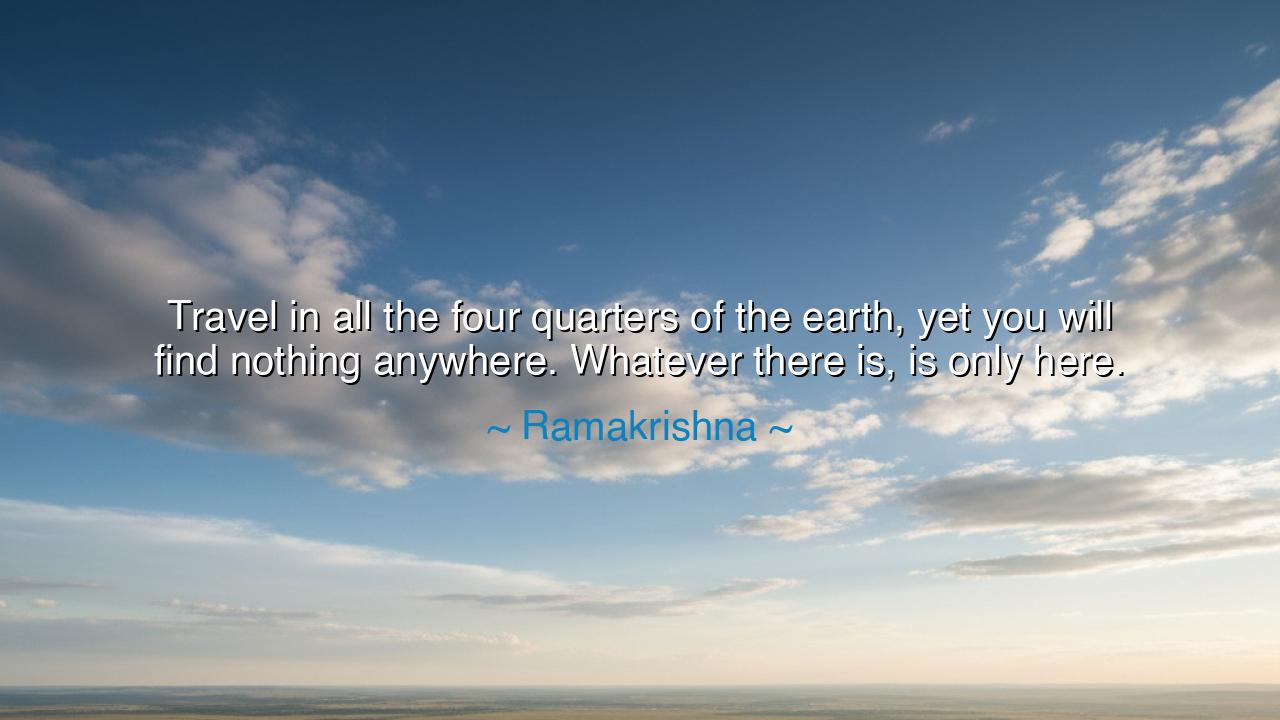
Travel in all the four quarters of the earth, yet you will find
Travel in all the four quarters of the earth, yet you will find nothing anywhere. Whatever there is, is only here.






The sage Ramakrishna spoke thus: “Travel in all the four quarters of the earth, yet you will find nothing anywhere. Whatever there is, is only here.” These words are not to be taken lightly, for they echo the wisdom of centuries—the cry of mystics, saints, and seekers who found that the treasures of the world are but illusions unless one learns to behold the eternal within. They speak to the restless soul, forever chasing horizons, believing that fulfillment lies just beyond the next mountain or across the next sea. Yet Ramakrishna unmasks the mirage: the source of peace, of truth, of divinity—it lies not “there,” but here.
The four quarters of the earth—north, south, east, west—represent the endless pursuits of humankind. Some seek wealth in the bustling markets of the west, some chase wisdom in the ancient schools of the east, some seek conquest in the north, and others indulgence in the south. But the wandering spirit soon learns that each place offers only reflections, never the essence. The essence dwells not in geography but in the heart. Thus the sage proclaims: though the earth be circled a thousand times, the answer is found only in the stillness of one’s own being.
This lesson finds echo in the tale of Siddhartha Gautama, the Buddha. He left behind palaces, riches, and all manner of earthly pleasures, wandering across kingdoms in search of enlightenment. He studied under masters, endured austerities, and nearly starved himself to death. Yet none of these “elsewheres” brought him the truth. It was only when he sat beneath the Bodhi tree, rooted in the “here” of his own presence, that the veil lifted. The realization came not from traveling to another quarter of the world, but from awakening to the kingdom within.
So too, in more recent times, countless wanderers have crossed seas in search of meaning. Consider the example of Henry David Thoreau, who, though surrounded by the bustle of New England, sought solitude at Walden Pond. In the quiet, he discovered that the richness of life was not in distant lands but in perceiving the eternal in the everyday: the ripple of water, the rising of the dawn, the sound of a bird’s wing. His travels were not outward but inward, and from that journey came wisdom that still guides hearts today.
Yet Ramakrishna’s teaching is not a denial of travel. To journey is noble, to witness the beauty of distant lands is enriching. But his words caution against delusion—the delusion that salvation lies at the end of the road, that joy hides in some faraway place. One may circle the globe a thousand times, but unless the eye of the soul is opened, one returns empty-handed. On the other hand, a person who has awakened may sit in the humblest hut, beneath the simplest roof, and yet see the fullness of heaven.
The meaning of "here" is profound. It is not merely a physical location but the eternal present, the living now. To dwell “here” is to be free of regret for the past and hunger for the future, to see divinity not in some promised elsewhere but in this breath, this moment, this heartbeat. The restless spirit says, “I will be content when I arrive there,” but the awakened spirit whispers, “Whatever there is, is already here.” Thus the teaching strikes not at the feet that wander but at the mind that flees.
For those who hear this teaching, the lesson is clear: seek not peace in the far horizon before first discovering it in your own heart. If you feel restless, pause. If you hunger for meaning, look within. Meditate, breathe, listen to the silence that underlies all sounds. Walk in nature, not as one searching for treasure, but as one realizing that the treasure already surrounds you. By cultivating awareness, gratitude, and presence, you discover that what you sought in the four corners of the earth was never absent—it was always here.
Thus, to future generations, let this wisdom be passed down: travel if you must, but do not forget the great paradox. The road may show you many sights, but the greatest discovery is made not across the seas, but in the depth of your own being. Carry this truth wherever you go: the world’s vastness is but a mirror, and its reflection will remain empty until you awaken to the light that already burns within. In this way, the teaching of Ramakrishna becomes not a boundary to your journeys, but the very compass that makes them meaningful.






AAdministratorAdministrator
Welcome, honored guests. Please leave a comment, we will respond soon